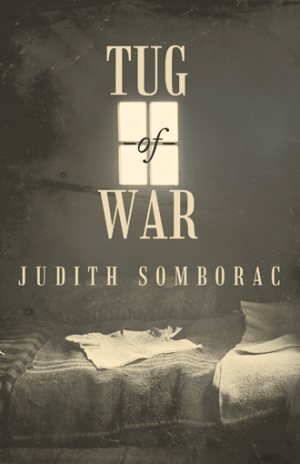Tug-of-War
This touching story plainly told provides a captivating view of wartime Serbia, its tensions, and its effects on ordinary working people.
Judith Somborac’s Tug-of-War follows the fictional experience of one young woman’s coming-of-age in World War II Serbia. Teenage Miriana sees upheavals to the size and shape of her household, grasps for fortitude, and glimpses hints of love. Her war years are stressful but formative, and the resulting tale is compelling and heartfelt.
Miriana is fifteen years old when her story begins in 1942. She lives with her parents in a tiny home in rural Serbia. Their meager livelihood has already been challenged by Nazi occupation when Miriana’s aunt Lily, whose husband has been arrested, appears from Belgrade with her two-year-old son in tow. The child tests Miriana’s patience, especially since she loses her own room to the newcomers. Meanwhile, the family hides partisan soldiers in their cellar at great risk, the situation growing increasingly dangerous as Lily is called upon to translate for the Germans. Miriana desperately hopes to continue her schooling, but she may be needed at home. Her best friend, Stefan, is likewise pressured to leave school to help support his mother and grandparents, but his passion for the violin makes this a bitter choice.
Miriana’s life is materially modest by today’s standards, sweetly buoyed by simple pleasures of family and community, but plagued by the menace of occupation and the conflict between Nazis, partisans, and royalists. Despite the anguish of a family afflicted by these hostilities and the tragedies they endure, Tug-of-War is simultaneously a surprisingly uplifting story, and Miriana a likable character. She grows and matures as she is forced to help support her family, and comes to better understand the people around her. Her story is not especially complex, but it is a fair example of the human condition, and it accomplishes in few pages an affecting character sketch and an expression of wartime trials.
The uncomplicated plot nevertheless manages surprises, and brisk pacing keeps is engaging for what can easily be a single-sitting read. The writing and dialogue are straightforward rather than flowery, but the subject matter is riveting and doesn’t call for embellishment. A few awkward moments stand out in the opening pages; for example, Miriana’s hair is described as “bushy” several times on a single page. However, as soon as her absorbing story begins to unfold, any such stylistic hiccups become invisible.
Easy-to-read and engrossing, this short, accessible novel will satisfy fans of historical fiction and stories of humble people meeting great challenges.
Reviewed by
Julia Jenkins
Disclosure: This article is not an endorsement, but a review. The publisher of this book provided free copies of the book and paid a small fee to have their book reviewed by a professional reviewer. Foreword Reviews and Clarion Reviews make no guarantee that the publisher will receive a positive review. Foreword Magazine, Inc. is disclosing this in accordance with the Federal Trade Commission’s 16 CFR, Part 255.

